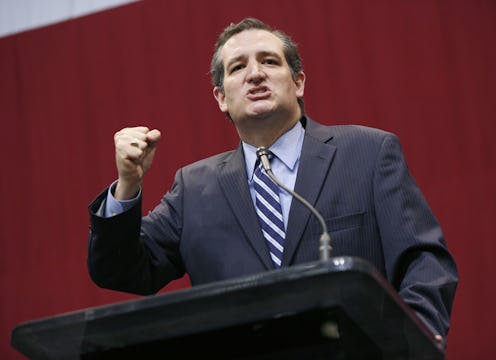News
Ted Cruz Still Wins Delegates In Oregon's Primary
In a surprising turn of events that's sure to leave spectators scratching their heads, Ted Cruz won some delegates in Oregon's Republican primary, even though he suspended his campaign on May 4.
As with other states, Oregon's ballots were likely printed weeks before Cruz dropped out of the race and therefore didn't reflect the ever-shrinking cast of Republican candidates. But Cruz's relative "win" in Oregon marked a somewhat surprising moment for the former presidential candidate since he suspended his campaign (and his dreams of becoming POTUS) earlier this month. By winning three delegates and finishing with 17.3 percent of the vote, it was clear that, for whatever reason, a handful of voters in Oregon were still holding out hope for Cruz.
Sure, Cruz only won three delegates in Oregon's Republican primary, but three delegates is still a decent amount for someone who hasn't even been campaigning. But, to be fair, John Kasich, who also dropped out of the presidential race in early May, received three delegates as well.
Despite the relatively low number of delegates, I'm left wondering if Cruz will get back in the race? He had hinted at it the week after he suspended his campaign, clarifying he would only get back into the race "if there was a path to victory."
Before this year's election, the terms "delegate" and "superdelegate" were relatively unknown outside of political circles. Searches for "delegate count" spiked briefly in presidential election years, but those spikes are nothing in comparison to 2016, when search queries about delegates skyrocketed.
The recent explosion of interest in delegate counts is likely due to the tight race between Hillary Clinton and Bernie Sanders for the Democratic nomination. Sanders supporters have counted on the 712 unpledged "superdelegates" as the saving grace for their candidate's campaign. As left-leaning wonks began digging into the complicated delegate system, others on the right, including Trump, began criticizing the delegate system by calling it corrupt.
Even in plain English, the system is complex: Each state is allocated a number of "delegates" that attend each party's convention and vote for the party's nominee for president. The way states allocate delegates is not uniform: Most states either have a "winner-take-all" system where all of the state's pledged delegates go to the winning candidate, while others have a proportional system in which delegates are awarded based on percentage.
Although Cruz, Rubio, and Kasich have all suspended their campaigns, they are not "officially" dropped out, and could still decide to re-enter the race. It's more likely, however, that their pledged delegates will remain "unbound" and be able to vote for the candidate of their choosing at the RNC. With Trump as the presumptive nominee, many delegates are opting out of traveling to Cleveland in July at all. But at any rate, it was pretty impressive for Cruz to still earn a few delegates in this primary even after he dropped out. Maybe these three delegates will inspire Cruz to get back on his presidential horse and re-enter the race? (Probably not.)
Correction: A previous version of this article misstated the number of delegates Ted Cruz had won after dropping out.
